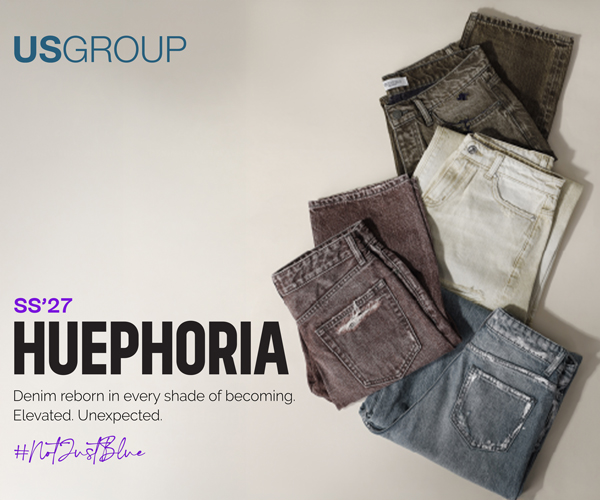Simon Giuliani - “We need to produce what we sell, not the other way around”

Simon Giuliani, head of marketing and sustainability for Candiani, calls for a better alignment of industrial business goals with responsible production practices. One of the key issues that needs to be addressed, he says, is overproduction.
The fashion industry, often celebrated for its creativity and trendsetting power, faces a pressing environmental crisis. The rapid cycles of fast fashion and non-transparent supply chains have led to a system that prioritises profit over the planet. Despite the growing awareness and discussions about the need for sustainable practices, the industry’s strong focus on price continues to impede progress.
Overproduction stands as a formidable obstacle in the fashion industry’s journey towards sustainability. The surplus of clothing far exceeds demand, leading to a price-driven sales strategy. This relentless pursuit of low-cost production often comes at the expense of quality, sustainability and ethical considerations. In their pursuit of competitiveness, Western countries have heavily relied on cheap, long-distance supply chains. Despite efforts to introduce regulatory frameworks to mitigate the fashion industry’s negative impact, this reliance persists. Imported garments, which account for 77% of all European purchases according to EURATEX, contribute significantly to the environmental and social costs of global production.
The consequences of overproduction extend beyond environmental damage. Consumers are becoming increasingly detached from products and brands, losing respect, interest and loyalty. The relentless pursuit of lower prices has eroded the value proposition of brands and their garments. This has created a fertile ground for fast fashion brands, which thrive on offering trendy, low-cost clothing. Consumers have lost appreciation for the craftsmanship, design and materials that go into making a garment. The emotional connection between consumers and their clothing has diminished, as evidenced by the exploding second-hand market.
I believe that the fashion industry should prioritise a controlled degrowth plan to rebalance demand and supply and that this transition should be based on value generation, just like it happened with food 20 years ago. This plan involves reducing over-production by putting people and product back on centre stage and redefining traditional business models to decouple them from price predominance. We need to produce what we sell, and not the other way around, and innovation is our bridge between sustainability and competitiveness. Through advancements in technology, the implementation of Industry 5.0, and data analytics, we can engineer smart products and design lean business models to achieve a new efficiency that comprises environmental and financial sustainability.
It is also necessary to connect with consumers in a new way by providing education through edutainment and transparency to visualise the value of craftsmanship, materials and ethical considerations behind each garment. Building a fresh relationship with the brand through various customer services, such as repair, take-back programmes and upcycling, will enable brands to establish a new relevance that aligns with current conversations. By doing so, we can encourage consumers to appreciate the value of their clothing again instead of the price. Not to mention, if you produce on demand, locally, using responsible, smart materials while ensuring a safe and healthy environment for workers, you will automatically comply with the upcoming regulations of the institutions guiding Western countries.
Our mill, Candiani Denim, a family-owned Italian textile manufacturer, has been dealing with these topics and developing solutions since 1974, when the area surrounding the mill was declared Italy’s first regional park and nature reserve. With innovation as our main driver, we started to adapt our production processes to align with the regulations of the nature reserve and to engineer our products, focusing not only on aesthetics and performance but also on environmental responsibility.
The Fashion Transparency Index analysed that if we were to cease garment production today, we would have enough clothing to sustain six generations. Therefore, we believe that future products must be high quality, durable and designed to last to extend their lifespan across multiple wardrobes. Additionally, high-quality guarantees for maximum recyclability at the end of their life cycle. We have developed circular materials such as Coreva, the world’s first biodegradable and compostable stretch denim, and Re-Cyclone, a premium post-consumer recycled denim, to minimise waste and the use of new natural resources and to promote a circular economy.
We went beyond fabric engineering and tried envisioning a model to rebalance demand and supply by connecting the manufacturer directly with the consumer. The Candiani Custom micro-factory in the heart of Milan allows customers to design and customise their own jeans on a journey from cotton seed to final product. We produce the jeans entirely in the micro-factory through a resized industrial process and deliver made-to-measure jeans. Amongst many benefits, this on-demand, direct-to-consumer approach empowers consumers, making them feel proud of what they wear, and eliminates traditional inefficiencies. The relationship with our customer is built on trust and transparency, which convert into loyalty and growth.
By prioritising value generation, education and circularity, the fashion industry can create a more sustainable and resilient future. Shifting away from a price and volume-driven model and embracing innovative practices can help companies build long-lasting relationships with consumers and contribute to re-establishing a healthier environment for business and the planet.
PHOTO: Giorgio Figini












